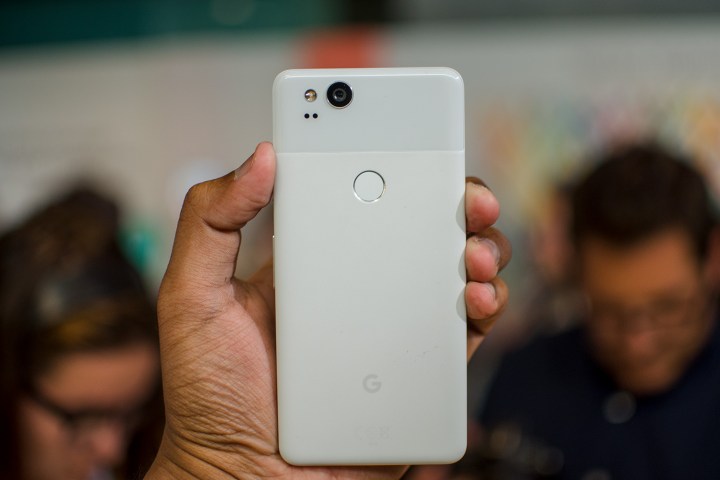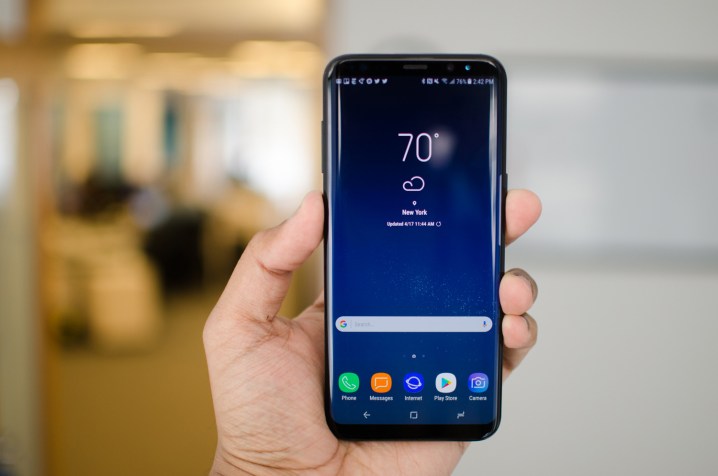
Loaded with a Snapdragon 835 processor and an even more advanced camera, the Pixel 2 — all gruff about the bulky bezels aside — is certainly no sophomore slouch. That said, how does this latest iteration measure up against Samsung‘s flagship
Specs
Galaxy S8 |
Pixel 2
|
|
| Size | 148.9 x 68.1 x 8 mm (5.86 x 2.68 x 0.31 inches) | 145.7 x 69.7 x 7.8 mm (5.7 x 2.7 x 0.31 inches) |
| Weight | 155 grams (5.47 ounces) | 143 grams (5.04 ounces) |
| Screen | 5.8-inch Quad HD Super AMOLED | 5-inch AMOLED display |
| Resolution | 2,960 x 1,440 pixels | 1,920 x 1,080 pixels |
| OS | Android 7.0 Nougat | |
| Storage | 64GB (U.S.) 128GB (International) | 64GB, 128GB |
| MicroSD card slot | Yes | No |
| NFC support | Yes | Yes |
| Processor | Qualcomm Snapdragon 835 | Qualcomm Snapdragon 835 |
| 4GB | 4GB | |
| Connectivity | GSM / CDMA / HSPA / LTE | GSM / CDMA / HSPA / LTE |
| Camera | Rear 12MP with OIS, front 8MP | 12.2 MP rear with OIS, 8 MP HD front |
| Video | ||
| Bluetooth | Yes, version 5.0 | Yes, version 5.0 |
| Fingerprint sensor | Yes | Yes |
| Other sensors | Barometer, gyroscope, accelerometer, compass, heart rate, proximity sensor, iris scanner | Barometer, gyroscope, accelerometer, compass, proximity sensor, Active Edge |
| Water resistant | Yes, IP68 | Yes, IP67 |
| Battery | 3,000mAh | 2,700mAh |
| Charging port | USB-C | USB-C |
| Marketplace | Google Play Store | Google Play Store |
| Colors | Black, silver, gray, blue, gold | Black, Blue, and White |
| Availability | AT&T, Verizon, T-Mobile, Sprint, Unlocked from Samsung | Unlocked from Google, Verizon |
| Price | $725 | $650 |
| DT review | 4 out of 5 stars | Hands-on Review |
Both the Google Pixel 2 and Samsung’s Galaxy S8 pack the same Qualcomm Snapdragon 835 processor with 4GB of
In terms of storage, you get more options to choose from with the Pixel 2 as there’s a 64GB and 128GB variant. With Samsung, you’re stuck with the 64GB model in the U.S., though there’s a MicroSD card slot which lets you add more space if you want.
It’s a close round, but we’re giving the edge to the Pixel 2.
Winner: Google Pixel 2
Design, display, and durability
Aesthetically speaking, one of the biggest mobile trends in 2017 has been the move away from thick bezels — the edges flanking the front of the screen. These two phones look vastly different, because one embraces this trend, while the other is far from it. The
With the second iteration Pixel, Google has retained large bezels. The Pixel 2 maintains the unique aluminum and glass build mixture on the rear which we like, but one can’t help but notice the thick, almost clunky, edges around the screen. The Pixel 2 looks straight from 2015.
Thin bezels aren’t just an aesthetic advantage — it allows the
The S8’s Super AMOLED display takes up 83-percent of the front panel, and the 2,960 × 1,440 pixels pixel resolution offers pristine image quality. The Pixel 2’s AMOLED screen has a standard Full HD 1,920 x 1,080 pixel resolution, and while it still looks great, the
The Pixel 2’s Full HD screen makes it more efficient from a processing and battery-consuming perspective, but the
Unlike the
The
It’s not a contest. The
Winner: Samsung
Camera

The original Google Pixel was heralded as the best camera phone available and with the follow up Pixel 2, Google built on this solid foundation. In fact, camera review site DxOMark recently gave the Pixel 2 a score of 98 out of 100 — the highest rating ever awarded for a
In our brief hands-on time with the Pixel 2, we saw virtually no shutter lag while snapping shots with the optical image stabilization-equipped 12-megapixel camera. The Motion Photos feature, which is almost the same as Apple’s Live Photos, allows you to capture three seconds of video by simply tapping the shutter icon. Best of all, the Pixel 2 has a Portrait Mode feature without the need for a dual camera set up. Machine learning and software algorithms help identify the primary subject in a photo, and the background is then blurred for images that pop. As it’s all done via software, it works with the front-facing 8-megapixel camera as well for spectacular selfies.
The
We’ll have to do more testing, but from what we’ve seen the Pixel 2 seems to have the better camera at the moment.
Winner: Google Pixel 2
Software
As Google designed the hardware and
The Google Pixel 2’s software is the pure
Regardless, the ability to get fast version and security updates gives the Pixel 2 the win.
Winner: Google Pixel 2
Battery life and charging
We found the
We weren’t fans of the battery life on the original Pixel, as we found it struggling to stay alive by 7 p.m. on a regular work day. We’re sad to see a small downgrade in battery capacity from the 2016 Pixel, from 2,770mAh to 2,700mAh in the Pixel 2.
Winner: Samsung
Pricing and availability
The Google Pixel 2 is available for pre-order now and will set you back a cool $650. It’s available unlocked from the Google Store, or directly from Verizon. It’s not as widely available as the
The
Winner: Google Pixel 2
Overall winner: Google Pixel 2
While the Google Pixel 2 probably won’t win any awards for design anytime soon, the phone itself is worth every penny. Google bolstered the latest Pixel 2 with a faster, more efficient processor, and even somehow managed to upgrade the already spectacular camera. The
Editors' Recommendations
- Best Samsung Galaxy S23 Ultra deals: How to get the phone for free
- Best Samsung Galaxy deals: S24, Buds, Watches and more
- The best Samsung Galaxy S23 deals from every carrier
- Motorola just launched a new Android phone to take on the Google Pixel 8a
- The best Google Pixel 8a screen protectors in 2024



